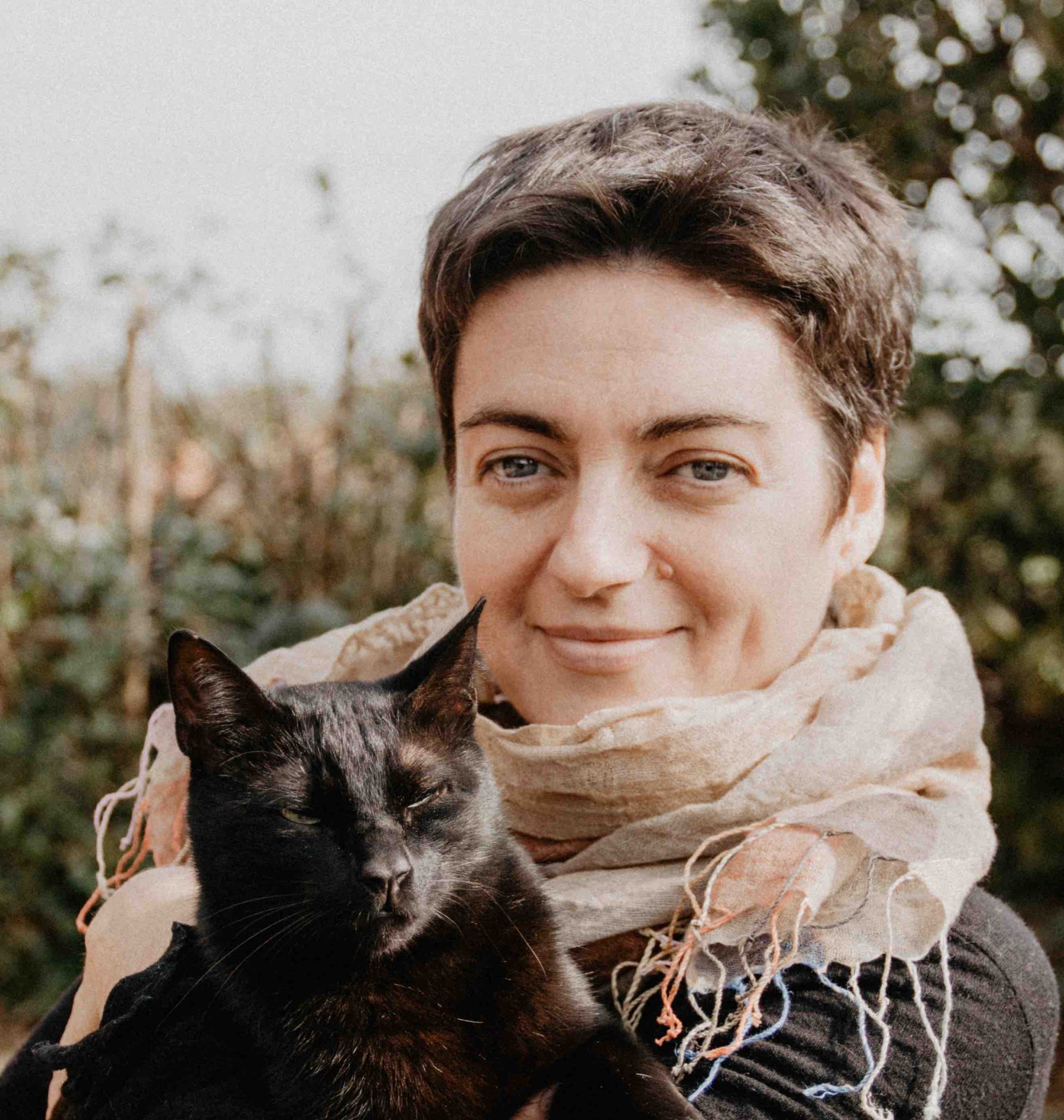In this conversation for Beyond Borders, Núria Almiron, Co-Director of the UPF-Centre for Animal Ethics and Professor at Pompeu Fabra University in Barcelona, Spain, speaks with Chloe Wellington-Hunt, Editor in Chief of Informed.org, about the politics of animal ethics, the animal industrial complex, and the power of communication in shaping public perception and policy toward non-human animals.
Chloe: To begin, I’d love to start with an introduction to you and your work. I’m a vegan and have a strong interest in animal ethics, but I’ve never thought about animal ethics through such a multi-faceted lens as the Center does. I’d be curious to hear about what led you and your academia background to animal ethics at UPF.
Núria: Thank you for your interest. My work is situated in Critical Animal Studies (CAS) rather than animal ethics in the strict philosophical sense. CAS builds on the foundations of animal ethics but is not a branch of philosophy about how we should treat animals; instead, it is a multidisciplinary approach to understanding how animals are actually treated and the social, political, and communicative structures that sustain that treatment.
My own focus is on communication—especially persuasive communication—examining how media, public relations, and other forms of strategic discourse shape public perception and policy regarding animals. I collaborate not only with philosophers but also with sociologists, psychologists, anthropologists, linguists, and others. This multidisciplinarity is essential because the human–animal relationship is produced and maintained through many intersecting forces—cultural, economic, linguistic, and institutional—so no single discipline can capture the full picture.
We created the UPF-Centre for Animal Ethics (UPF-CAE) precisely because this kind of perspective was missing. From my own discipline of communication, I observed a strong concern for social justice and a rich tradition of social critique, yet almost all of it was incoherent—people were calling for justice in some areas of human life while continuing to ignore or exploit animals. You cannot claim to act ethically only in certain aspects of your life and remain blind to others. The Centre was born to address that gap in academia, and includes animal ethicists, critical animal scholars and human-animal studies scholars.
Chloe: Can you tell me about the “animal industrial complex”?
Núria: The animal industrial complex is a very useful term because it captures the complexity of the exploitation humans have created for non-human animals. It points to a network rather than simply a collection of businesses—a network that is largely invisible yet multi-layered, encompassing economic, political, media, academic, and social dimensions. Together, these layers work to produce, promote, and perpetuate the systematic and institutionalized exploitation of non-human animals across all business sectors. Within this network, animals are effectively turned into slaves, workers, or forced participants—mere units in the production chain.
My own work approaches this mainly from a political-economy perspective of persuasive communication, examining how strategic messaging and public relations help naturalize and normalize animal use, operating with minimal transparency and, at times, near invisibility. This lack of visibility makes public scrutiny difficult and reinforces speciesist practices. For instance, when a government debates new animal-welfare regulations, agribusiness associations, pharmaceutical companies, scientific institutions, advertising agencies, and even certain media outlets often speak with a shared vocabulary of “innovation,” “progress,” and “feeding the world.” These actors may have different immediate interests, but together they form a discourse coalition that frames animal exploitation as necessary and beneficial. This alignment of narratives—across politics, science, business, and media—is exactly the kind of discursive power the animal industrial complex enables.
Chloe: As the Co-Director for the Center – in its 10th year – what are the biggest priorities across the spectrum of animal ethics for you? What’s on your mind right now across politics, public opinion, and more?
Núria: My main priority is to raise awareness that the treatment of animals is a profoundly transcendent moral and social issue. It is not a niche concern or a matter of personal lifestyle; it is something that defines who we are as a society. For me, this question cuts across political ideologies and appeals to common sense and basic justice that anyone can grasp: in today’s world, more than ever, causing harm to individuals of other species is no longer necessary. My focus is on making this reality visible and undeniable, so that debates on politics, policy, and public opinion can begin from the recognition that ending unnecessary harm is both rational and fair. Although I believe most of my colleagues at the UPF-CAE would share this view, I speak only for myself, as the Center values and reflects a plurality of voices and approaches.
Chloe: Following up on that, what are some of the “trends” you’re seeing across the EU and in Spain in terms of animal agency / lack there of?
Núria: I see two main trends emerging across all EU countries. The first is that institutions, media, companies, and large segments of society have all adopted the language of respect for animals—the idea that it is civilized and just not to cause suffering. This has certainly helped to spread awareness. At the same time, however, this has also diluted the message, as many of these actors embrace it more for image—because it appears trendy—or out of fear, for example of environmental or health concerns, rather than out of genuine conviction. They publicly align with the narrative, yet behind the scenes they take few meaningful steps forward and sometimes even slow or obstruct real progress.
The second trend is a strong reactive movement. Unfortunately, animal defense is increasingly framed—by some commentators and political groups—as part of a broader “progressive agenda,” which provokes rejection among people who resist that larger package of ideas. This framing is not accidental: some segments of that same agenda are also trying to co-opt animal defense as a symbolic cause, using it as another marker in broader cultural battles rather than pursuing meaningful change for animals. As a result, even measures grounded in simple compassion and common sense can face opposition not on their merits but because of the cultural and political associations attached to them, feeding what are often described as ongoing culture wars.
In short, the trends I observe today reflect more instrumentalization than genuine concern, with animal defense increasingly portrayed as a niche issue of the political left—dynamics that ultimately hinder meaningful progress for animals. This does not mean there is no real progress; the number of people who are sincerely concerned and consistent in their commitment is clearly growing, but in my view, this remains secondary to the dominant trend.
Chloe: So, your expertise – or one of your areas of expertise – is within the realm of power relations and dynamics. For those who are unfamiliar, can you share why this is relevant to animal ethics studies?
Núria: Power relations are central because animal exploitation is not just a matter of individual choices but the result of organized social, economic, and political forces. Understanding how power operates—through institutions, markets, media, and discourse—is essential to explain why exploitation persists and how narratives are built to justify it, which is exactly where animal ethics and critical animal studies intersect. This does not mean that individuals are exempt from responsibility; rather, it reminds us that personal choices unfold within—and are constantly shaped by—enormous forces seeking to influence public opinion. This is precisely what Critical Animal Studies contribute: they place these power dynamics at the center of analysis, whereas traditional animal ethics, while invaluable in articulating the moral arguments for animals, has tended to focus more on what we ought to do than on how social and political structures sustain the status quo. For this reason, the two perspectives complement one another, offering a fuller understanding of both the moral arguments and the social conditions that shape them.
Chloe: I’m quite interested in the Animal Ethics Classroom. I know it’s been a few years since you pioneered this initiative, but what’s its status? What are your goals with touching more youth?
Núria: The course I teach is Critical Animal and Media Studies, an elective within our MA in International Studies in Media, Power and Difference. I helped to found this master’s program in 2015 with the aim of training communicators to engage with vulnerable groups in society through mutual understanding, respect, and compassion. This focus is crucial because the way we represent “otherness” in media and public discourse shapes how those who are represented are perceived and treated. Although this perspective is not entirely new, at the time there was only one similar master’s program in Europe, in the United Kingdom, and it addressed only human groups. I saw an important opportunity to offer such a program here while also including non-human animals as a vulnerable group. The Critical Animal and Media Studies course has now been running for ten years and consistently receives very positive evaluations; many students describe it as an eye-opening experience. This is telling: even in a time when respect for animals is widely discussed, students still find that the course reveals new ways of thinking and makes connections they had not encountered before.
Chloe: The Center has researchers essentially across all ends of the academic spectrum – communications, law, anthropology… a bit of everything. Is there any discipline you would like to see more ethics-focused research from or perhaps an under-highlighted academic population you would like to see contribute?
Núria: What I feel is missing is not so much the presence of particular disciplines—although of course more engagement from every field is always welcome—but rather a deeper, more genuine commitment across the university as a whole. Awareness of animal suffering and the call to respect non-human animals has entered academia widely, but often in a superficial, marketing-driven way. Universities highlight vegan options in their cafeterias or host occasional events, yet research agendas remain largely shaped by speciesism—prioritizing human interests and justifying the instrumental use of animals. Institutional catering still treats plant-based meals as exceptions rather than a norm, animal experimentation continues to be standard practice, and funding priorities rarely challenge these structures. So the need is less about bringing the topic into one discipline or another, and more about moving from appearance to conviction, ensuring that respect for animals informs not just isolated initiatives but the everyday operations and research culture of the university itself.
Chloe: And finally, I know we have a lot of people who –through their own research and experience– are becoming more interested and concerned about animal welfare. What advice would you give to them on how they can make impacts in their everyday life, based on much of the Center’s findings?
Núria: From my own work on strategic communication, one clear lesson is that no single message works for everyone. There are as many audiences as there are strategies, and effective influence requires meeting people where they are. The key is to look for the arguments that resonate with them, not simply the ones that feel most convincing to us, and to adapt both the content and the tone depending on the person’s stage of awareness and on our relationship with them.
Above all, I encourage avoiding a war-like mindset. Approaching others with hostility—whether toward farmers, scientists, or anyone involved in animal use—only reinforces defensiveness and slows change. Instead, we can invite people to see that reducing or ending harm to animals is the logical, fair, and beneficial path for everyone, much as we already accept the moral imperative not to harm other humans. Change is more likely to happen when the conversation appeals to shared values of justice, compassion, and common sense rather than to conflict or blame.


